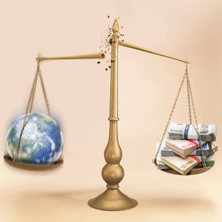As 2010 was ending and economic forecasters were looking ahead to 2011, the global economy seemed poised to continue its robust expansion. "The baseline scenario was of sustained solid growth in advanced economies and a strong expansion in emerging countries," writes Galina Alexeenko, a director with the Atlanta Fed's Regional Economic Information Network (REIN), in "Shocks Unbalance the Global Economy."
But shortly after the new year began, the global economy was buffeted by a series of shocks, which slowed the global expansion. Advanced economies experienced markedly slower growth, while emerging markets lost some of their growth momentum.
Civil unrest in some of the oil-supplying countries of North Africa and the Middle East caused oil prices to rise in the spring of 2011. This headwind to growth was accompanied by others, including higher prices for food commodities and supply chain disruptions caused by the Japanese earthquake and tsunami. According to some estimates, this event alone shaved up to half a percentage point from world economic growth in the second quarter, writes Alexeenko.
Additionally, renewed concerns about the sovereign debt crisis in the peripheral euro zone countries also dragged on the global economy, as business and consumer sentiment in the euro zone dipped. Financial markets channeled this negative sentiment to other economies, including the United States.
 As they did in 2010, advanced and emerging economies in 2011 experienced differing growth trends. The advanced economies experienced hiccups that did not affect the emerging world to the extent that they did in the past, notes Alexeenko, partly because of the economic powerhouse of East Asia. That region's economy is "large and dynamic enough to generate sizable import demand for foreign products," she writes. "In fact, in contrast to the anemic expansions in advanced economies, economic growth in emerging countries was strong enough in 2011 to generate concerns about potential overheating."
As they did in 2010, advanced and emerging economies in 2011 experienced differing growth trends. The advanced economies experienced hiccups that did not affect the emerging world to the extent that they did in the past, notes Alexeenko, partly because of the economic powerhouse of East Asia. That region's economy is "large and dynamic enough to generate sizable import demand for foreign products," she writes. "In fact, in contrast to the anemic expansions in advanced economies, economic growth in emerging countries was strong enough in 2011 to generate concerns about potential overheating."
Looking ahead to 2012, the disparity is likely to continue. Emerging countries are expected to continue their trend of strong growth, although the pace could moderate somewhat if external demand weakens enough, Alexeenko notes. Meanwhile, advanced economies will likely continue to struggle with high unemployment, sickly housing markets, and weak income growth—and these factors will be a drag on consumer confidence. On a brighter note, inflationary pressures are likely to moderate further in 2012, and business investment should stay strong along with demand for advanced economies' exports.
Economists are tempering this somewhat optimistic view with some caution, notes Alexeenko, because of the risks posed by the financial stress in Europe, political squabbling in the U.S. over fiscal issues, and potential credit and real estate bubbles in some emerging countries.
To read more details about the 2011 global economy and learn what could be in store for 2012, be sure to read the full story, online or in print, in the fourth quarter 2011 issue of EconSouth.


